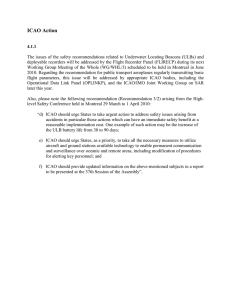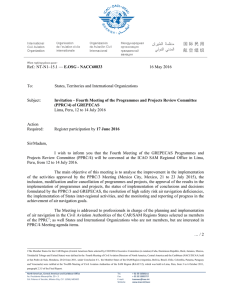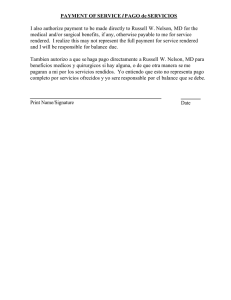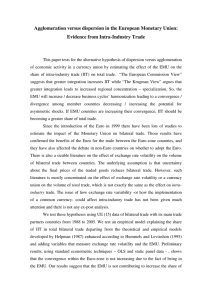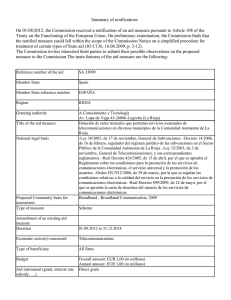State letter 09/28
Anuncio
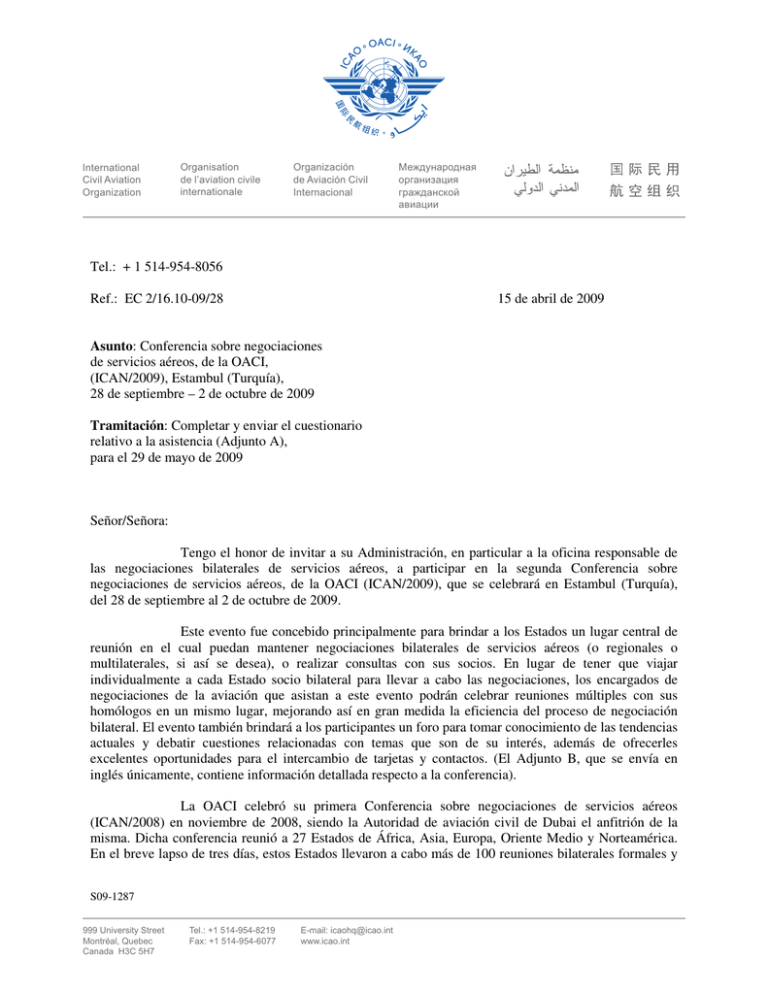
International Civil Aviation Organization Organisation de l’aviation civile internationale Organización de Aviación Civil Internacional Международная организация гражданской авиации Tel.: + 1 514-954-8056 Ref.: EC 2/16.10-09/28 15 de abril de 2009 Asunto: Conferencia sobre negociaciones de servicios aéreos, de la OACI, (ICAN/2009), Estambul (Turquía), 28 de septiembre – 2 de octubre de 2009 Tramitación: Completar y enviar el cuestionario relativo a la asistencia (Adjunto A), para el 29 de mayo de 2009 Señor/Señora: Tengo el honor de invitar a su Administración, en particular a la oficina responsable de las negociaciones bilaterales de servicios aéreos, a participar en la segunda Conferencia sobre negociaciones de servicios aéreos, de la OACI (ICAN/2009), que se celebrará en Estambul (Turquía), del 28 de septiembre al 2 de octubre de 2009. Este evento fue concebido principalmente para brindar a los Estados un lugar central de reunión en el cual puedan mantener negociaciones bilaterales de servicios aéreos (o regionales o multilaterales, si así se desea), o realizar consultas con sus socios. En lugar de tener que viajar individualmente a cada Estado socio bilateral para llevar a cabo las negociaciones, los encargados de negociaciones de la aviación que asistan a este evento podrán celebrar reuniones múltiples con sus homólogos en un mismo lugar, mejorando así en gran medida la eficiencia del proceso de negociación bilateral. El evento también brindará a los participantes un foro para tomar conocimiento de las tendencias actuales y debatir cuestiones relacionadas con temas que son de su interés, además de ofrecerles excelentes oportunidades para el intercambio de tarjetas y contactos. (El Adjunto B, que se envía en inglés únicamente, contiene información detallada respecto a la conferencia). La OACI celebró su primera Conferencia sobre negociaciones de servicios aéreos (ICAN/2008) en noviembre de 2008, siendo la Autoridad de aviación civil de Dubai el anfitrión de la misma. Dicha conferencia reunió a 27 Estados de África, Asia, Europa, Oriente Medio y Norteamérica. En el breve lapso de tres días, estos Estados llevaron a cabo más de 100 reuniones bilaterales formales y S09-1287 999 University Street Montréal, Quebec Canada H3C 5H7 Tel.: +1 514-954-8219 Fax: +1 514-954-6077 E-mail: [email protected] www.icao.int -2oficiosas (un promedio de cuatro reuniones por cada delegación), las cuales condujeron a la concertación y firma de más de 20 acuerdos/arreglos. Estas reuniones, así como otras oportunidades para establecer redes de contactos de trabajo, han dejado la puerta abierta para la cooperación futura y el mejoramiento de las relaciones en materia de aviación y servicios aéreos. Basándose en los resultados positivos de este evento y en lo solicitado por los Estados participantes, la OACI ha decidido que, en adelante, este evento se celebrará en forma regular y en diversas regiones. Tengo el agrado de comunicarle que la Dirección General de Aviación Civil, del Ministerio de Transportes de Turquía, se ha ofrecido generosamente a ser anfitrión del evento que ha de celebrarse este año en Estambul. El programa provisional de la conferencia comprende lo siguiente: a) sesión de apertura (Día 1 por la mañana) b) sesión del seminario (Día 1) c) reuniones bilaterales privadas, uno a uno (desde el Día 2 hasta el Día 5) d) sesión de clausura (Día 5) Me permito alentar a su Administración a aprovechar asimismo esta excepcional oportunidad para programar reuniones bilaterales con algunos de sus socios de la aviación que estarán presentes en la conferencia. La información relativa a los arreglos administrativos para el evento (p. ej., salas de reuniones, lista de delegaciones participantes, programas de reuniones bilaterales, tarifas de hoteles y reservas, etc.) se proporcionará en el sitio web seguro dedicado a la conferencia en: http://www.icao.int/ICAN2009 (contraseña: marketplace), o bien por correspondencia directa. Le agradecería tenga a bien completar el cuestionario relativo a la asistencia, que figura en el Adjunto A, y enviarlo directamente al Sr. Yuanzheng Wang, Director de la Conferencia, por correo electrónico: [email protected], o por fax: +1 514-954-6744, para el 29 de mayo de 2009, a más tardar. Le ruego acepte el testimonio de mi mayor consideración y aprecio. Taïeb Chérif Secretario General Adjuntos: A — Cuestionario B — Información relativa a la Conferencia sobre negociaciones de servicios aéreos (ICAN), de la OACI ADJUNTO A a la comunicación EC 2/16.10-09/28 CUESTIONARIO Se ruega enviar su respuesta por fax: + 1-514-954-6744 (Atención: Sr. Y.Z. Wang, ATB); o por correo electrónico: [email protected] Nombre del Estado: ____________________ Nombre de la persona que envía la respuesta: __________________________ 1. [ ] Sí, participaremos en la segunda Conferencia sobre negociaciones de servicios aéreos, de la OACI, (ICAN/2009), que se celebrará en Estambul (Turquía), del 28 de septiembre al 2 de octubre de 2009. [ ] No, no participaremos en la ICAN/2009. En el caso afirmativo, tenga a bien indicar a continuación cuáles son los países con los que desearía reunirse y programar una reunión bilateral: _________________ _________________ _________________ _________________ _________________ 2. Durante la sesión del Seminario, inmediatamente después de la ceremonia de apertura del Día 1, la OACI tiene la intención de organizar sesiones de información y/o deliberaciones sobre los temas que se mencionan más adelante. Se ruega utilizar números del 1 al 5 (de menor a mayor) para indicar su grado de interés en el tema en cuestión. [ ] Sesión de información sobre las últimas tendencias de reglamentación y liberalización del transporte aéreo internacional [ ] Deliberaciones sobre la liberalización del acceso a los mercados/los derechos de tráfico (cielos abiertos) [ ] Deliberaciones sobre la liberalización de la propiedad y el control de los transportistas aéreos (apartándose de la tradicional cláusula de nacionalidad en el acuerdo bilateral de servicios aéreos) [ ] Cualquier otro tema de interés que desee debatir (se ruega especificar): _________________________________________________________________________________ 3. A fin de facilitar nuestra comunicación con usted (y la suya con otros socios de negociaciones bilaterales), se ruega proporcionar su información de contacto, o la del funcionario a cargo de las negociaciones de servicios aéreos. Nombre (en caracteres de imprenta): _________________ Cargo y Departamento/Oficina: _________________ Correo electrónico: _________________ Teléfono: _________________ Fax: _________________ ———————— En inglés únicamente ATTACHMENT B to State letter EC 2/16.10-09/28 INFORMATION ON THE ICAO AIR SERVICES NEGOTIATION CONFERENCE (ICAN) 1. BACKGROUND 1.1 The 2003 ICAO fifth Worldwide Air Transport Conference (ATConf/5) addressed, among other things, the issue of how ICAO could facilitate and assist States in the liberalization process. The conference concluded inter alia that “ICAO should explore the feasibility and possible benefits of serving as a global marketplace, where ICAO provides the facilities and any expertise that may be required, for States to discuss and exchange market access at the bilateral and/or plurilateral levels” (Doc 9819, Report of the Worldwide Air Transport Conference, Item 4.1, Conclusion c)). The performance of this task was subsequently endorsed by the Council of ICAO. 1.2 To follow up on this task, the ICAO Secretariat further developed the idea and consulted States through a survey on how this concept may work in practice (State letter EC 2/16.9-07/56 dated 24 August 2007). The survey revealed that the majority of the responding States were positive about this proposal, but some improvement to the operational aspects was required. Taking into account the feedback from States, the Secretariat has developed a detailed plan for executing the project, which is explained in the following sections. 2. THE PROBLEM FACED BY STATES 2.1 Most of the world’s international air transport services have been governed by a web of over 4000 bilateral air services agreements between States. One of the shortcomings of the bilateral system is the negotiation/consultation process, whereby each State has to negotiate or consult with each and every one of its bilateral partner States regarding the establishment or operation of air services between them. This process can be time consuming and expensive, particularly when a State has to negotiate with many States. The need to travel and conduct numerous negotiations/consultations can place a heavy burden on governments having limited resources, and cause undue delays to the desired negotiations, thus hampering the efficient operation and expansion of international air carriers in an increasingly competitive and fast-changing environment. 3. THE ICAO SOLUTION 3.1 What is the solution? A “one-stop shop” approach is proposed to help overcome this shortcoming and to improve the efficiency of the bilateral negotiation/consultation process. The idea is for ICAO (or a hosting State) to provide a central meeting place where States could gather and conduct multiple bilateral air services talks with partners from different countries (i.e. similar to a marketplace where people come to do business with one another). ICAO’s role is to provide the meeting facilities, help bring interested States together, provide the necessary conference services and, where appropriate, organize seminar(s) on topics of interest to participants. 3.2 What are the benefits? The benefits for States include: a) saving time and money. Instead of having to travel to each of their bilateral partner States for air services negotiations or consultations, States could come to one location but conduct several bilateral talks with their aviation partners (existing and/or potential); b) excellent networking opportunities. Participants can meet many of B-2 their fellow counterparts (old and new) at social functions of the event; and c) a forum to get advice and discuss topical issues. Through informal seminar or panel discussion, participants could learn about relevant ICAO policies and guidance (e.g. model bilateral clauses on aviation safety, security, template bilateral or regional agreements), and/or discuss topical issues of interest to them. 3.3 Who should participate? States should send officials from the government or aeronautical authorities who are responsible for bilateral air services negotiations or international aviation relations; and/or officials from the civil aviation authorities who handle international air transport matters under the bilaterals. Like the usual bilateral talks, a State’s delegation may also include representatives from other government departments involved in air services negotiation or regulations (e.g. customs, taxation authorities), and from the industry (e.g. airlines). In short, a State can send officials it considers appropriate for the intended talks. 3.4 What can States do at this event? Unlike the usual ICAO meetings, this event is primarily for States or their designated entities (including regional bodies) to conduct their own bilateral meetings (and regional or plurilateral, if so desired) with their aviation partners. As such, States have the total discretion to decide the nature and content of their bilateral meetings (as well as the level of their representatives), just like conducting their usual bilateral talks. 3.5 At the event, delegations from participating States or their aeronautical authorities would hold private one-on-one meetings with their counterparts. Each delegation can decide with its counterparts the agenda of their meeting, subject matters to be discussed, whether the meeting is to be formal or informal, and whether the counterpart is to be a bilateral partner State, a group of States or a regional body. As for the content of the talks, they could, for example, discuss matters relating to the implementation or modification of their bilateral air services agreements (e.g. exchange of traffic rights, expansion of route rights, airline designations, capacity arrangements, doing business matters); and/or exchange views on issues of mutual interest relating to their aviation relations; and/or explore areas of cooperation (e.g. on aviation safety, security); or schedule future bilateral talks, etc. 3.6 This ICAO event is not meant as a substitute for all existing formal bilateral talks between States (such as those requiring several rounds of substantive negotiations for a new bilateral air services agreement). Rather, it offers an additional facility which States can use to improve the efficiency of their bilateral negotiation or consultation process. It may be of particular value to aeronautical authorities that frequently need to consult with different bilateral partners on operational matters relating to the implementation of their air services agreements. 4. HOW SUCH AN EVENT WOULD BE ORGANIZED 4.1 Timing and scale. Such an event can be held regularly (e.g. once or twice annually) and in different regions, perhaps by rotation. The conference is open for participation to all States, not only those from the region where it is held but also States from other regions who wish to participate. Timing of the conference is determined in consultation with the host State, giving due regard to the time required for preparation. 4.2 Duration. In order to accommodate the needs of each participating State to conduct several bilateral meetings, the event would have a duration of three to five working days, depending on the anticipated size of attendance. 4.3 Programme. The event can usually be structured to include: a) a brief opening session; b) an informal seminar if deemed desirable; c) private bilateral talks between States (the main activity of the event); and d) a closing session. B-3 4.4 Organizational Process 4.4.1 Step 1. Determining venue and dates. The ICAO Secretariat, in consultation with an appropriate host State, where applicable, decides on the location and dates for the event and makes necessary arrangements for the meeting facilities and logistic support for the event. 4.4.2 Step 2. Inviting States to participate. The ICAO Secretariat issues an invitation to States to participate in the conference. Where appropriate, regional civil aviation bodies (or other regional entity designated by States to engage in aviation talks) may also be invited to participate. Invited States are requested to advise ICAO regarding their participation (including indication of the States they wish to meet at the conference). 4.4.3 Step 3. Matching and scheduling bilateral meetings. Based on the responses received from the invited States, the ICAO Secretariat compiles a list of bilateral meetings by matching the requests and assigning a slot for each meeting. This list is then sent to the participating States, requesting them to: a) indicate if they wish to make any adjustments; and b) contact and consult directly with the countries they wish to meet concerning their bilateral meetings. Based on the feedback from States, the ICAO Secretariat will make necessary adjustments to the list of bilateral meetings and schedules, and provide the updated information to participating States through the conference secure website and/or direct correspondence. 4.4.4 Step 4. The conference website. The ICAO Secretariat establishes and maintains a secure conference website which will provide all relevant information about the conference, including the programme, administrative arrangements, delegation list, meeting schedules, and hotel information. The website may also be used to facilitate the process of requesting, matching and scheduling meetings, and pre-registration of delegates. 4.4.5 Step 5. Pre-registration of delegates to the conference. Participating States are requested to notify the ICAO Secretariat in advance the names of their delegates to the conference (including their positions). No other registration is required if this advance notice is given by the competent authorities. The ICAO Secretariat will confirm receipt of such notification and pre-register the delegates. 4.5 Communication between ICAO and participants, and between States 4.5.1 The unique nature of this event requires direct, effective and expeditious communication between the ICAO Secretariat and the negotiating office of participating States. All effective channels would be utilized including correspondence, e-mail and secure website. 4.5.2 Direct communication between participating States is essential for the preparation of bilateral meetings at the conference. States are strongly encouraged to contact and consult with their partner States in advance (e.g. regarding their meeting schedule, the agenda or subjects of discussion for their bilateral talks). Where requested, the ICAO Secretariat may also assist such communication (e.g. by providing contact information or conveying messages). 4.5.3 As no interpretation service will be provided by ICAO for any of the bilateral meetings between States, those States that need such service should make their own arrangements or consult with their counterparts in advance to make the necessary arrangements. B-4 4.6 Conduct of the meeting on-site 4.6.1 Registration. The ICAO Secretariat, in coordination with the hosting country, would arrange registration of all participants before or at the meeting. 4.6.2 Opening of the event. A brief Opening Ceremony will be held for all participants, in which welcoming remarks will be made by the host country and ICAO, and administrative announcements will be made by the ICAO Secretariat. Where deemed desirable and appropriate, ICAO may organize informal seminar(s) or panel discussion(s) for the benefit of the participants, which may take place after the Opening Session or at other appropriate times during the event. 4.6.3 Bilateral meetings. After the Opening (and the Seminar Session, if added), participating delegations will start their private one-on-one bilateral talks with their partners in the pre-assigned meeting rooms and according to the pre-set schedules. As these bilateral talks are conducted in private between the parties concerned, confidentiality of their meetings is assured. 4.6.4 Closing. At the end of the event, a Closing Ceremony may be held to which all participants will be invited to attend (allowing interaction between the organizer and participants, and an expression of thanks to the host). 5. FINANCIAL IMPLICATIONS 5.1 For ICAO. The ICAO Secretariat is responsible for the organization and conduct of this conference. In principle, this project can be undertaken on a cost-recovery basis. The preparatory work will be undertaken as part of the approved ICAO work programme in the air transport field, within the approved Regular Budget. If the event is held at ICAO Headquarters, internal coordination is required regarding provision of the required meeting rooms. When the meeting is hosted by a State away from Headquarters, the cost of travel and accommodation for the ICAO staff serving the meeting will need to be addressed in consultation with the State hosting the event. 5.2 For the Host State. The State hosting the event will bear the costs for providing the required meeting facilities, the associated logistic support and services, including: a) a conference room for the opening/closing session (and possible side seminars) and a sufficient number of smaller private meeting rooms for bilateral meetings; b) assistance for the event (including administrative support staff, printers, photocopiers, stationary supplies and internet access); and c) official reception/dinner and other host-organized hospitality programmes (e.g. excursion tours). In addition, the host is also expected to help cover the travel and accommodation cost for the ICAO staff serving the meeting on-site. 5.3 For the participating States. States participating in the event are expected to bear all the costs for their participation, including travel to/from the meeting venue, hotel accommodation, and other private activities outside the organized programme of the meeting. It must be noted that such costs, however, will be outweighed by the substantial savings that may be achieved through the combination of several separate negotiation trips, which is the major benefit of this ICAO project. — END —
